11.23.15Jeff Li’s Guest Post on Peer Tutoring, Part 2
If you read the first part of this guest post on the topic of peer tutoring by Kipp Infinity’s Jeff Li, you’ve probably been eagerly awaiting the second part. So here it is [Cue fanfare]. In this part Jeff describes what makes for a successful tutor and shares some of his student’s own reflections.
WHAT MAKES A GREAT TUTOR?
One big takeaway from this work: the strongest math students are not necessarily the strongest tutors. It turned out that the best tutors were empathetic, kind, patient, and took the time to truly understand the other student’s misunderstanding.
After a few weeks of peer tutoring, I crowd-sourced the most effective and popular tutors (the kids gravitated to a handful of tutors) and then set out to observe what made them effective. These four principles emerged:
1. Teach a KIPPster to fish.
The most effective tutors focused on whether their tutees could apply their learnings on their own, and provided the least amount of scaffolding possible (much like a good spotter in weightlifting). The really effective ones even created practice problems on their own to quiz their tutees to see if they truly understood a concept.
2. Be an archaeologist of student thinking.
The most effective tutors also did not just jump into teaching another student. They first looked at what the student had already tried, asking probing questions until they could pinpoint the exact point of misunderstanding. Rather than saying, “this is how you do a problem,” they would spend the first few minutes carefully trying to understand where the student is before jumping in.
3. Be nice.
Certain tutors would give subtle indicators in their body language or choice of words that made their students feel self-conscious. For example, when asked to give help, they might say, “Oh #5? That’s easy. Let me show you.” Something as innocent-sounding as that sends a message that the student was struggling on a problem that others had no trouble with, making the student feel dumb. Something like, “Oh #5? Yes, I can see how that one can be tricky in some places. What are you thinking so far?” made a HUGE impact on whether a tutor was successful.
4. Be a true friend.
The most effective tutors were able to realize that the ultimate expression of friendship is to help their friends achieve their long-term goals, even if that meant sacrificing short-term fun. These tutors were able to work without getting off-task, and even disciplined their friends when they needed to be. For this reason, I did not shy away from having “besties” become peer tutors with each other; I just pulled them aside, talked about the meaning of true friendship, and then let them work with each other. I saw this as an exercise to improve their self-control, and while it might be difficult in the short term, it would have huge long term benefits.
IT’S ALL ABOUT CHARACTER.
I have to say that this is my biggest takeaway. I was blown away by how it helped develop the character of my students. They were forced to change their self-concept. To be effective, they had to have an incredible amount of empathy, curiosity, optimism, social intelligence, and self-control. They were constantly helping people around them every time they tutored.
When I was a child, my father used to say to me that he cared less about my grades or other outward indicators of success. “What I hope most for you,” he said, “is for you to be a decent human being.” I told the kids this story over and over again, and always framed peer tutoring in this light. I think it made a difference.
At the end of the year, I give them a blank sheet of paper and say, “This is the last time we will be together in this way, in this space. I am giving you a blank sheet of paper. I have no rules for what you write on this paper but whatever you write, I will try to keep it forever.” I felt that by leaving it open-ended, I could get a real gauge of what students took away from my classroom.
Here are a few selections showing what they wrote:
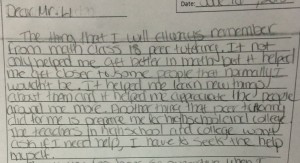
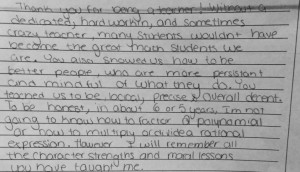
GRATITUDE IS SUCH A BIG PART OF THIS, TOO.
I also noticed the genuine outpouring of gratitude that developed between students. We had blank index cards always available anytime anyone wanted to express gratitude toward another student, and this became a real driver of the culture of peer tutoring. Here is a student describing her experience with receiving gratitude cards while seeing this student’s growth. And this was written MONTHS after the actual incident had happened, which is a pretty big deal for adolescents.

And another; a student here talks about one element of peer tutoring that “worked”:
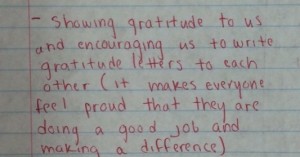
And here are a few samples of gratitude cards that kids sent each other throughout the year:
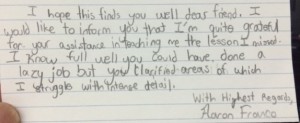
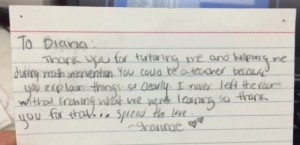
And the tutors would even show gratitude toward their tutees:

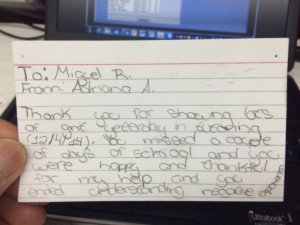
OH, AND ONE LAST THING.
I didn’t want to forget to say that after every after-school math tutoring session, we would play a highly addictive arcade basketball game called “Double Shot.” This was probably not an insignificant part of making peer tutoring work. J
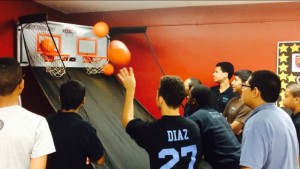
SUMMARY
This post is not intended to say that peer tutoring is the only driver of the results we’ve had, or that it is some sort of silver bullet for student achievement. There are so many factors that go into a successful math program and a successful school. My purpose is to share one strategy that could be powerful – particularly for educators looking for ways to not only improve the academic achievement of their students, but also the amount of responsibility for learning that students take on, and of course, their character.
And it was just fun to be a part of, which is something I think we talk too little about in education.
Infinite thanks to the entire staff and leadership of KIPP Infinity Middle School (including our wonderful principal, Allison Willis Holley, and KIPP’s founder, Dave Levin), and in particular the math department – Angela Fascilla, Joe Negron, Carly Scott, Janine Whitman, Alexa Roche, Lauren Abramson, and Brice Messavussu – for their incredible work that continues to this day and beyond.
Any feedback and ideas are welcome – my email is jli@kippinfinity.org.
